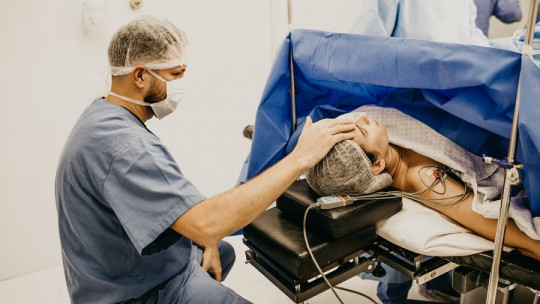
It has been proven in different investigations that The fact of feeling anxiety affects the state before and after surgical intervention. Therefore, it will be important to work on it to improve the patient’s condition and speed up his recovery.
Various techniques have been found useful to manage fear and the feeling of anxiety in general, adapted according to the age of the person being treated and their characteristics.
In this article we discuss the effect of patient anxiety on surgical interventions and we will see several tips on how to manage anxiety before an operation.
Effects that a surgical intervention can produce
A surgical intervention is considered a stressful event for the individual, since it is an unpredictable event of which we do not know with absolute certainty what the final result will be like. Before an operation, the patient also feels that he loses control over himselfsince the surgery does not depend on him, making it very likely that anxiety may appear that affects coping with the intervention and subsequent recovery.
It has been observed that the optimal level of worry to face an intervention is moderate, since if the worry is very low, patients tend to be less cooperative and more irritable and angry, and on the contrary, Very high levels of this can lead to developing pathological fears and lead the person to also be less involved in their subsequent healing process.
In this way, it will be very important to assess and take into account the emotional and psychological state of the patient and what thoughts they have about the intervention before performing the surgery, since in this way we ensure that the process is not so negative or stressful and the subsequent recovery is better, with the subject being more cooperative.
How to deal with anxiety before an operation?
As we have seen, anxiety will impact post-intervention recovery; For this reason, it is essential to treat it and keep it in mind before performing surgery. In this sense, let’s look at several tips and strategies to help patients cope with anxiety before an operation.
1. Consider the different types of patients
Not all individuals benefit in the same way from the different anxiety coping techniques, and therefore psychological intervention is carried out in a personalized way.
One of the characteristics to be assessed is whether the subject presents sensitizing traits, that is, if he or she is an anxious and vigilant person in the face of pain sensations or, on the contrary, is a repressive person (who will deny stress and avoid any thoughts about it). In reference to patients with the first type of trait, by carrying out a study that consisted of watching films with or without information about the intervention, it was seen that they obtained positive results from watching the film; On the other hand, if the repressors saw the tape only once, they showed more anxiety than if they did not see it.
Another variable to consider is the typical coping style of each individual. It has been seen that there are patients who seek information about surgery, these being the ones who will benefit from receiving information and will thus show less anxiety. On the contrary, there are other people considered “avoidant” to whom, in order to ensure that anxiety does not increase too much or decrease, it is advisable not to give them too much information, or to only give them the essential information about the intervention.
In the same way, depending on whether doctors need the patient to be more or less active during the operation, one or the other coping style will be better. When it is important for the patient to intervene, the subject’s active style is beneficial; On the contrary, on occasions when less collaboration is needed, better results will be obtained if you remain passive by applying distraction strategies for anxiety.
Finally, another aspect to assess about the patient is their level of anxiety. It has been observed that patients with less anxiety will benefit more from receiving more information about the intervention; On the other hand, for those who have a higher anxiety trait, it will be better to provide them with the necessary information without going overboard.
2. Empower the patient
In an investigation that was carried out with patients who were going to undergo surgery, it was observed that Subjects who were given information about the pain they could feel and who were taught breathing techniques improved their state of anxiety.needed less painkillers and were discharged from the hospital sooner.
Thus, it has been seen that there are two types of information that are most effective in improving the patient’s condition. One of these types is to provide knowledge about the surgical procedure, this means give you a better understanding of what the intervention will be likewhat will happen before and after it, where the intervention will be performed, what subsequent treatment you will receive, how long it will take to recover your esteem…
The second type of information that has been proven to be beneficial is to provide you with knowledge about the sensations you will have, how you are likely to feel and feel before and after the operation. In this way we try to reduce uncertainty.

Having the opportunity to express yourself can help reduce your anxiety.to say how you feel, what your worries and fears are and thus be able to ask questions, reduce your degree of uncertainty and receive support from professionals, since, as we have mentioned, anxiety makes it difficult both to face the operation and to recover. later.
3. In cases of very intense anxiety, consult a psychologist
The doctor will be in charge of communicating the necessary information you need to know about the intervention, providing personal treatment and adapting his/her actions to the type of patient.
But if it happens that the anxiety does not decrease, being very high and detrimental to the procedure that will be performed, It will be recommended that you be referred to a psychologist in order to work more specifically on this anxiety and be able to train more precise techniques to reduce it, such as relaxation, psychoeducation, cognitive restructuring…
Emotional preparation for surgical interventions in young children
Children have characteristics or abilities that are different from those of adults, for this reason It will be necessary to adapt preparation and manage anxiety in the face of a future intervention.. In this way we also ensure that the first medical experiences are not negative, increasing the possibility that the children’s attitude regarding future treatments will not be bad.
It has been proven that it is necessary to adapt the information we give according to the age of the patient, so that they can have an adequate understanding of it and can really benefit from the process. Thus, in younger children, the information about the intervention is given in a very general way, doing it in the most playful way possible and showing them the different instruments that the doctor uses (the most specific information is given to their parents).
As the child grows, the amount of knowledge and specification of the information given increases.so once adolescence is reached, the same variables that are considered with adults will be taken into account.
In various investigations it has been observed that play helps children better understand their pathology and helps prepare them emotionally for different medical interventions. In a complementary way, it has also been seen that cBuilding a relationship of trust between the child and the professionals who will treat him or her can help reduce fear and anxiety.
Different procedures have been used to deal with anxiety in children; For example the technique of emotional imagination has been applied, which consists of the child imagining a hero who helps reduce anxiety. Another intervention method to overcome anxiety before an operation is based on muscle relaxation and breathing training complemented with images that the child likes, attention distraction strategies and self-instructions, to guide in stressful situations.
Finally, Another intervention that has been seen to be effective in minors is filmed modeling. This procedure consists of showing a film to the child showing the stay of a minor in the clinic from the moment he enters until he is discharged. At first, this child feels anxiety, but throughout the filming, ways to deal with it and techniques to reduce it are shown. Despite the benefits observed with this procedure, it has been seen that it is not recommended when the intervention is imminent, occurring on the same day, since the child will not have time to understand the information well.
Likewise, it will be important to introduce parents to the procedures we perform with children, since they will surely also have anxiety about the future operation and it will be necessary to prepare them to act as support for their children.








